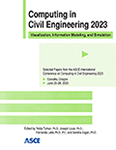Towards Improved Information Management at Commissioning Stage
Publication: Computing in Civil Engineering 2023
ABSTRACT
Buildings create a huge amount of information throughout their life cycle. The major information loss occurs during the building handover from the construction team to the owner. Communication of vast amount of information generated through the building life cycle is complex, error prone, and is insufficient, especially during commissioning stage, leading to unavailability of necessary information to the building owner and occupants. This research reviewed strengths and weaknesses of the current approaches to information management through the building life cycle. The research found that limited research has been focused on information management at the commissioning stage of construction and beyond. In addition, the research explored the requirements for adequate commissioning and digital technologies which can be used as potential solutions for efficient commissioning. It was found that digital technologies such as BIM, DT, AR, smart interactive system, and tools can lead to better communication and visualization of real-time building information.
Get full access to this article
View all available purchase options and get full access to this chapter.
REFERENCES
Baechler, M., and Farley, J. (2011). A Guide to Building Commissioning. Building Technologies Program. US Department of Energy,.
Barbieri, G., Bertuzzi, A., and Capriotti, A. (2021). A virtual commissioning-based methodology to integrate digital twins into manufacturing systems. Prod. Eng. Res. Devel. 15, 397–412 (2021). https://doi.org/10.1007/s11740-021-01037-3.
Critical asset. (2021). https://www.criticalasset.com/.
Crowe, J. (2019). The basics of building commissioning. Building Design + Construction. https://www.bdcnetwork.com/blog/basics-building-commissioning.
Eastman, C. M., Teicholz, P., Sacks, R., and Liston, K. (2011). BIM Handbook: A Guide to Building Information Modeling for Owners, Managers, Designers, Engineers and Contractors. New Jersey:Wiley.
Freeman, R. (2017). https://robfreeman.com/what-building-commissioning/.
Ganter, M., and Lützkendorf, T. (2019). Information management throughout the life cycle of buildings – Basics and new approaches such as blockchain. IOP Conference Series: Earth and Environmental Science. 323. https://doi.org/10.1088/1755-1315/323/1/012110.
Gilbert, S. W. (2013). Benefits and Costs of Commissioning: A Case Study Analysis. National Institute of Standards and Technology. https://doi.org/10.6028/NIST.IR.7964.
Guo, H. L., Li, H., and Skitmore, M. (2010). Life-Cycle Management of Construction Projects Based on Virtual Prototyping Technology. Journal of Management in Engineering. 26(1): pp. 41–47.
Hoeber, J. G., Alsem, D. M., and Willems, P. H. (2015). The management of information over the life-cycle of a construction project using open-standard BIM. Proc. of the 32nd CIB W78 Conference, 27th-29th, Eindhoven, The Netherlands.
Hu, W. (2008). Information Lifecycle Modeling Framework for Construction Project Lifecycle Management. International Seminar on Future Information Technology and Management Engineering, 372–375, doi: https://doi.org/10.1109/FITME.2008.142.
ISO. (2002). Systems engineering: System life cycle processes. ISO/IEC 15288: Standard. www.iso.org.
Jallow, A. K., Demian, P., Baldwin, A., and Anumba, C. J. (2008). Lifecycle approach to requirements information management in construction projects: state-of-the-art and future trends. Loughborough University. Conference contribution.
Jiao, Y., Wang, Y., Zhang, S., Li, Y., Yang, B., and Yuan, L. (2013). A cloud approach to unified lifecycle data management in architecture, engineering, construction and facilities management: Integrating BIMs and SNS. Advanced Engineering Informatics, 27 (2): 173–188.DOI: https://doi.org/10.1016/j.aei.2012.11.006.
Lee, S., and Akin, O. (2005). The Virtual-Augmented-Reality Environment for Building Commissioning-Case Study. International Conference for Enhanced Building Operation, Pittsburgh, PA.
Luo, N., Pritoni, M., and Hong, T. (2021). An overview of data tools for representing and managing building information and performance data. Renewable and Sustainable Energy Reviews, 147, ISSN 1364-0321. https://doi.org/10.1016/j.rser.2021.111224.
Mannino, A., Dejaco, M., and Re Cecconi, F. (2021). Building Information Modelling and Internet of Things Integration for Facility Management-Literature Review and Future Needs. Applied Sciences. 11. https://doi.org/10.3390/app11073062.
Mehta, M. L., Scarborough, W., and Armpriest, D. (2018). Building Construction: Principles, Materials, and Systems, Chapter 1: An Overview of the Building Delivery Process. 3rd Edition. Pearson.
Olbrich, M., Graf, H., Kahn, S., Engelke, T., Keil, J., Riess, P., Webel, S., and Picinbono, G. (2013). Augmented reality supporting user-centric building information management. The Visual Computer. 29: 1–13. https://doi.org/10.1007/s00371-013-0840-2.
Parsanezhad, P. (2015). A Lifecycle Approach towards Building Information Management. (thesis). Real Estate and Construction Management, Royal Institute of Technology, Stockholm. https://www.divaportal.org/smash/get/diva2:806658/FULLTEXT01.pdf.
Renaud, V., Christophe, N., and Christophe, C. (2008). IFC and building lifecycle management. Automation in Construction 18: 70–78.
Nývlt, V., and Prušková, K. (2017). Building Information Management as a Tool for Managing Knowledge throughout whole Building Life Cycle. IOP Conference Series: Materials Science and Engineering, 245 (4).
Wong, J. K. W., Ge, J., and He, S. X. (2018). Digitisation in facilities management: A literature review and future research directions. Automation in Construction, 92: 312–326.
Xu, J., and Lu, W. (2018). Smart construction from head to toe: A closed-loop lifecycle management system based on IOT. Construction Research Congress. 157–168. DOI: https://doi.org/10.1061/9780784481264.016.
Xu, X., Ma, L., and Ding, L. (2014). A Framework for BIM-Enabled Life-Cycle Information Management of Construction Project. International Journal of Advanced Robotic Systems. doi:https://doi.org/10.5772/58445.
Olanipekun, A. O., and Sutrisna, M. (2021). Facilitating Digital Transformation in Construction—A Systematic Review of the Current State of the Art. Frontiers in Built Environment, 7, 2297–3362, DOI=https://doi.org/10.3389/fbuil.2021.660758.
Information & Authors
Information
Published In
History
Published online: Jan 25, 2024
ASCE Technical Topics:
- Architectural engineering
- Building information modeling
- Building management
- Buildings
- Business management
- Construction engineering
- Construction management
- Engineering fundamentals
- Information management
- Life cycles
- Owners
- Personnel (type)
- Personnel management
- Practice and Profession
- Smart buildings
- Structural engineering
- Structures (by type)
Authors
Metrics & Citations
Metrics
Citations
Download citation
If you have the appropriate software installed, you can download article citation data to the citation manager of your choice. Simply select your manager software from the list below and click Download.
